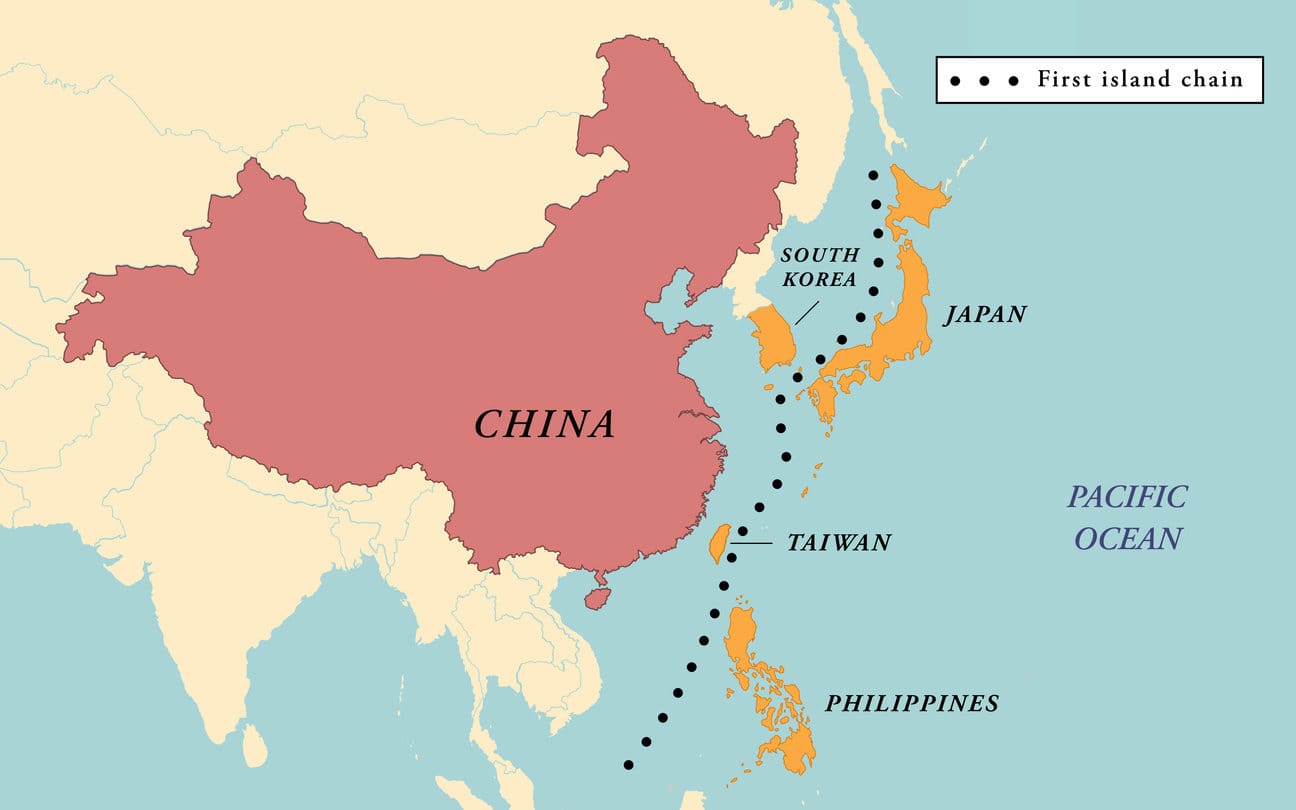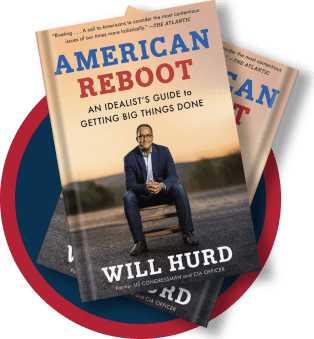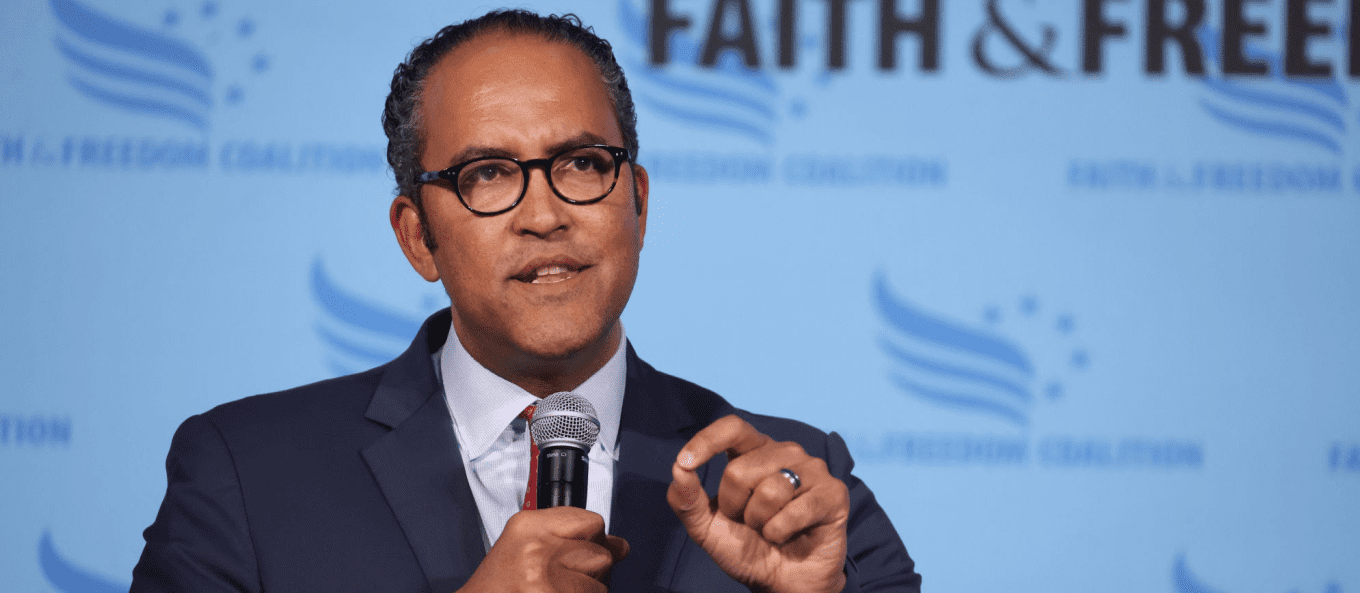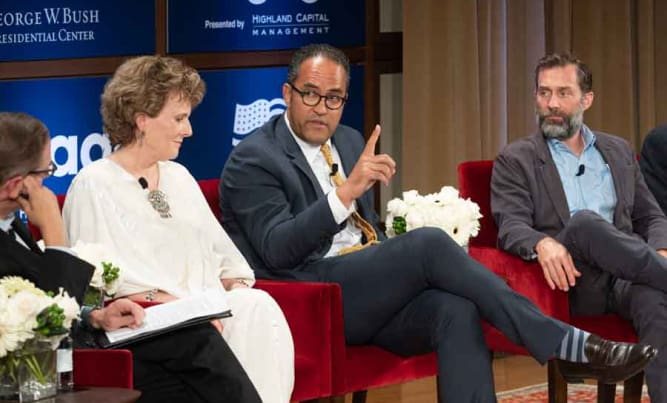Photo: Map of the First Island Chain
9 min read
Taiwan is a critical partner to the United States for multiple reasons. Economically, the US and Taiwan are top 10 trading partners, with bilateral trade reaching $114 billion in 2021. Taiwan is also one of the world’s leading manufacturers of advanced semiconductors. These critical components are in every electronic device and system, and Taiwan plays a key role in global supply chains for them.
In addition, Taiwan is an important strategic partner for the US in East Asia. As a young democracy, Taiwan shares the US’s commitment to democratic values and human rights. Taiwan’s location near mainland China makes it an important buffer against Chinese expansionism in the region.
Overall, Taiwan’s economic, strategic, and political importance to the US cannot be understated. Taiwan matters because our two countries share common interests and values and have built a strong partnership over the years. It is crucial that the US continues to nurture and strengthen this relationship moving forward.
Taiwan, A Strong Democracy

Photo: Taipei 101 Tower in downtown Taipei
Taiwan, with a population of 23.5 million people, is a vibrant island nation located 100 miles off the southeast coast of mainland China. With a mix of Chinese, Japanese, and indigenous influences, travelers to Taiwan will find a unique cultural experience. From the skyscrapers and buzzing nightlife of Taipei to the lush mountains and tranquil coastline, Taiwan, though slightly smaller than the states of Maryland and Delaware combined, is made up of a variety of landscapes.
Taiwan first began its transition to democracy in 1987, when after decades of single-party rule under the Kuomintang (KMT), martial law was lifted allowing for the formation of opposition political parties. Then in 1991, the Constitution was amended to allow for direct elections of the president and vice president.
The first direct presidential election was held in 1996, and the first peaceful transfer of power between political parties happened in 2000 when the Democratic Progressive Party (DPP) won the presidency.
In 2016, President Tsai Ing-wen of the DPP became Taiwan’s first female president, and she was re-elected in 2020. Today, Taiwan is considered one of the most vibrant democracies in Asia.
Semiconductor Manufacturing, Integrated Circuits and TSMC
The semiconductor industry in Taiwan is critical to the global economy. A semiconductor foundry manufactures integrated circuits on behalf of customers like Apple and NVIDIA. Integrated circuits are built on semiconductor material that can control the flow of electrical current. Integrated circuits, often referred to as chips, and semiconductors are the building blocks of the information revolution.
- Semiconductors and integrated circuits are essential components in electronic devices and systems including smartphones, computers, cars and consumer products like TVs and refrigerators.
Taiwan Semiconductor Manufacturing Company (TSMC) is a world leader in chip fabrication, and it is important that we recognize just how much we rely on this company.
With its vast market share, TSMC is responsible for fabricating a significant portion of the new computing power we use each year. However, the geopolitical implications of this dependency and the impact it has on U.S. China relations cannot be overlooked.
In a Time Magazine article. Chris Miller, the author of Chip War: The Fight for the World’s Most Critical Technology, compared Taiwan’s position in the semiconductor industry to Saudi Arabia in the oil industry:
- “TSMC has around 55% of the global market for contract chip fabrication, far above OPEC’s 40% market share for oil … Taiwan produces almost all the most advanced processors, a market position that makes Saudi Arabia’s 12% share of global oil production look unimpressive.”
We need to be mindful of the fact that Taiwan is in a precarious position, with China viewing it as a rogue province. As the United States has pledged to defend Taiwan, we must be vigilant about the security of this vital industry.
Is Taiwan part of the People’s Republic of China?

Photo: Taiwanese President Tsai Ing-wen and Chinese President Xi Jinping
The history of Taiwan is complicated. Relations between Taiwan and the People’s Republic of China (PRC) have been fraught since 1949, when the KMT government fled to Taiwan after losing the Chinese Civil War to the Chinese Communist Party (CCP). Beijing has consistently claimed Taiwan as part of its territory, even though Taiwan has effectively ruled itself independently for over 70 years.
Over the years, relations across the Taiwan Strait have ebbed and flowed. In the 1980s and 1990s, Beijing and Taipei began to engage in limited economic and cultural exchanges, and cross-strait relations thawed. However, in 1996, China conducted a series of missile tests near Taiwan in order to intimidate the island ahead of its first direct presidential election. Relations worsened again in 2000, when the DPP came to power, since they are seen as being more skeptical of closer ties with China.
Under the KMT (which is viewed as the political party most favorable to the PRC) from 2008-2016 relations improved significantly, with the two sides signing a number of economic agreements and increasing tourism and trade. However, since President Tsai Ing-wen of the DPP became president in 2016, relations have deteriorated again.
Beijing’s Attempts to Undermine Taiwan’s Democracy
As of late 2022, China’s foreign minister and President Xi Jinping has reiterated China’s desire for reunification and its long-held stance that “Taiwan is …. not an independent state and has no so-called president.”
- The term “unification” in the Taiwan-China context refers to the idea of Taiwan becoming part of mainland China.
Many wonder, “Why does China want Taiwan?” Beijing has long claimed Taiwan as part of its territory under its “one country, two systems” philosophy and has stated its desire to make it come under the dominion of the Chinese Communist Party, even threatening to use force if necessary. The China territorial claims map even shows Taiwan as part of its territory as well as larges swaths of the South China Sea, further complicating the geopolitical landscape and angering many of its neighbors.
However, the majority of people in Taiwan oppose unification. The Taiwanese people value their independence and democratic freedoms. The question of unification is one of the key issues in cross-strait relations.
Beijing has used several tactics over the years to undermine Taiwan’s independence:
- Beijing has attempted to isolate Taiwan diplomatically, pressuring other countries not to recognize or maintain formal relations with Taipei.China has increased military pressure on Taiwan, conducting military exercises near the island and flying warplanes into Taiwan’s airspace.
- It has also engaged in disinformation campaigns and cyber-attacks in order to undermine confidence in Taiwan’s democratic institutions.
Together, these tactics of Chinese aggression aim to weaken Taiwan’s independence and bring it closer to Beijing’s orbit.
The Relationship Between the United States and Taiwan – Status Quo
Photo: Presidential Office Building – Taipei
U.S. Taiwan relations have evolved significantly over the past several decades. Prior to 1979, the U.S. recognized Taiwan, then known as the Republic of China (ROC), as the legitimate government of China. However, in January 1979, the U.S. adopted a “One China” policy, switched its recognition to the PRC, and established diplomatic relations with Beijing.
While the U.S. no longer maintains formal diplomatic relations with Taiwan, it has continued to maintain unofficial ties. In 1979, the U.S. Congress passed the Taiwan Relations Act, which enables U.S. Taiwan relations in the absence of formal diplomatic ties. The act also obligates the U.S. to provide Taiwan with arms necessary for its self-defense, and to maintain the capacity to resist any use of force against it.
Throughout the 1990s and early 2000s, the U.S. and Taiwan continued to cooperate in a number of areas, with the U.S. selling billions of dollars in arms to Taiwan to bolster its defense capabilities. In 1996, the U.S. sent two aircraft carrier groups to the region after China conducted military exercises near Taiwan to intimidate the island nation.
The “status quo” when it comes to Taiwan refers to the fact that Taiwan has effectively ruled itself as an independent entity for over 70 years, even though the PRC claims the island as part of its territory. Maintaining this reality has meant that Taiwan has been able to continue with self-rule without interference from Beijing.
The Geopolitical and Economic Significance of Taiwan
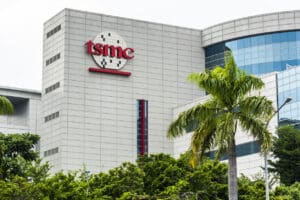
Photo: Taiwan Semiconductor Manufacturing Company (TSMC), the world’s largest dedicated independent semiconductor foundry – BING-JHEN HONG
Taiwan’s strategic position in the Indo Pacific highlights it’s importance in the island chain defense strategy. The first island chain refers to a series of archipelagos that stretch from the Japanese islands, Taiwan, down to the northern parts of the Philippines, and parts of Indonesia.
This island chain acts as a natural barrier to limit the naval reach of countries within it, especially China. Given its location, Taiwan is a pivotal part of this chain, acting as a buffer against potential Chinese attack or Chinese invasion of one of our allies. Taiwan’s role in the first island chain is crucial for regional stability and for the defense strategies of countries like the U.S., Japan, and South Korea.
Furthermore, Taiwan’s proximity to South Korea underscores the interconnectedness of regional security dynamics. Both nations play a pivotal role in ensuring the stability of the world economy, especially in the semiconductor industry. For instance, disruptions in the manufacturing of advanced chips in Taiwan or South Korea could have cascading effects across the tech sector.
Taiwanese companies are at the forefront of technological innovation and contribute significantly to the world economy. Their role in the global market is not just about numbers but also about the quality and innovation they bring to the table. These companies, coupled with South Korea’s tech giants, form a robust line of defense in ensuring supply chain security and technological advancement.
The economic development of Taiwan, backed by its thriving Taiwanese companies, has a ripple effect on the global market. Their contributions, especially in the semiconductor industry, are indispensable. The stability of Taiwan, therefore, is not just a matter of regional security but is intrinsically linked to the health of the global economy.
The US administration’s Approach to Taiwan – Strategic Ambiguity
In recent years, the relationship between the U.S. and Taiwan has continued to evolve. The U.S. has increased its arms sales to Taiwan, with the Trump administration approving over $15 billion in arms sales to Taiwan since 2017. Additionally, U.S. officials of both parties have made shows of support to Taiwan in recent years. During her tenure US House Speaker Nancy Pelosi led a high-level visit to Taiwan. Also during his tenure, US House Speaker Kevin McCarthy became the highest ranking U.S. official to host the Taiwanese President on American soil.
“Strategic ambiguity” refers to the US’s policy towards Taiwan, which has long been deliberately unclear. While every American leader from Jimmy Carter to President Joe Biden has been committed to Taiwan’s security and has sold billions of dollars in arms to the island over the years, it has never explicitly stated whether or not it would defend Taiwan in the event of an attack by the Chinese Communisty Party. This ambiguity is meant to deter China from taking military action against Taiwan, while avoiding a direct confrontation with Beijing.
Could a War Break Out Between China and Taiwan?

Photo: 1995-96 military exercise areas from Australian National University – The New York Times
With China ready to fight, it is becoming increasingly aggressive towards Taiwan, using both rhetoric and military activity to signal its displeasure. The Chinese military, specifically the People’s Liberation Army (PLA), has been conducting exercises encircling Taiwan, demonstrating its capabilities to isolate and attack the island. This new pattern of behavior threatens the peace and stability of the region, and further tilts the balance of military power in China’s favor. Taiwan, while still highly capable, is struggling to keep up with the PLA’s growing capabilities. As tensions continue to rise, the risk of miscalculation and military conflict increases.
China’s Risk Calculation
Chinese leaders have stated clearly that they want to complete unification by making Taiwan become part of China by 2049, the year China celebrates 100 years of communist rule. While the US may have previously acted as a deterrent against Chinese aggression towards Taiwan, that deterrence is not as certain as it used to be. Chinese leaders must determine whether the US is unable or unwilling to intervene, which may make them more likely to risk an attack. However, the decision to invade Taiwan is still a political one, and the Chinese leadership must weigh the risks of such a move to their economy, including the potential for a large international backlash and impact on the U.S. China relationship.
Additionally, China and Taiwan’s economies are interwoven, and a war would be devastating to both economies. China is Taiwan’s largest trading partner and biggest import partner, with a total of $515 billion in goods exported between January 2017 and January 2022 – double that of the United States.
The Weight of Russian Sanctions on China’s Plans to Invade Taiwan
The first lesson on a potential invasion of Taiwan that China has taken away from Russia’s invasion of Ukraine is go in heavy. The Chinese believe that the Russians made a strategic mistake but not using an overwhelming force when invading Ukraine. If China is to make Taiwan part of China, they will have to build, assemble and deploy an overwhelming force.
The second lesson is to become resilent to international financial sanctions. China saw how the U.S. and our allies were able to use the international financial system to pressure Russia’s economy. This is why the Chinese government is working with its fellow BRICS nations to diminish American financial influence around the world.
The third lesson the Chinese have taken away from the Ukrainian War is that if they cross the Taiwan Strait in an attempt to subjugate the Taiwanese people, then the international community will move swiftly to disconnect China from the global financial system. U.S.-China trade ties are significant. China knows that a significant part of its economy is tied to the international community, so they would have to survive on their own and with a few key allies like North Korea and Russia.
The Chinese leadership is also mindful that if they attempt to take Taiwan by force, they will likely face severe sanctions and isolation from the international community. The Chinese government is keenly aware of the impact of sanctions on Russia’s economy and the Russian people. The Chinese leadership is wary of risking a similar outcome, knowing that it would undermine the legitimacy of the CCP and the stability of the country.
Why This All Matters
Taiwan’s 70 years of self-rule is in more danger today than it has been at any point in its history. The Xi regime in China seems determined to bring a decisive conclusion to its long-term strategic dance with its former territory. One way or the other, the status quo is likely to be shattered.
As with Russia’s invasion of Ukraine, it will ultimately fall to the US and the world to decide whether an autocratic regime gets to decide whether or not its neighbors should be free. This choice affecting Taiwan’s fate is likely coming sooner rather than later, and with so much at stake – economically, strategically, and most importantly with the lives of 23 million people hanging in the balance – we would do well to be prepared for the coming crisis.
First time reading? If you want rational takes on foreign policy, politics and technology then sign up below for “The Brief.” It’s a twice a month email on things that aren’t being discussed but should – all in 5 minutes or less.


